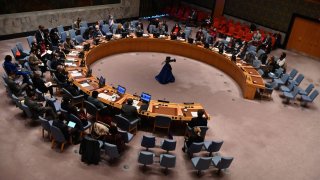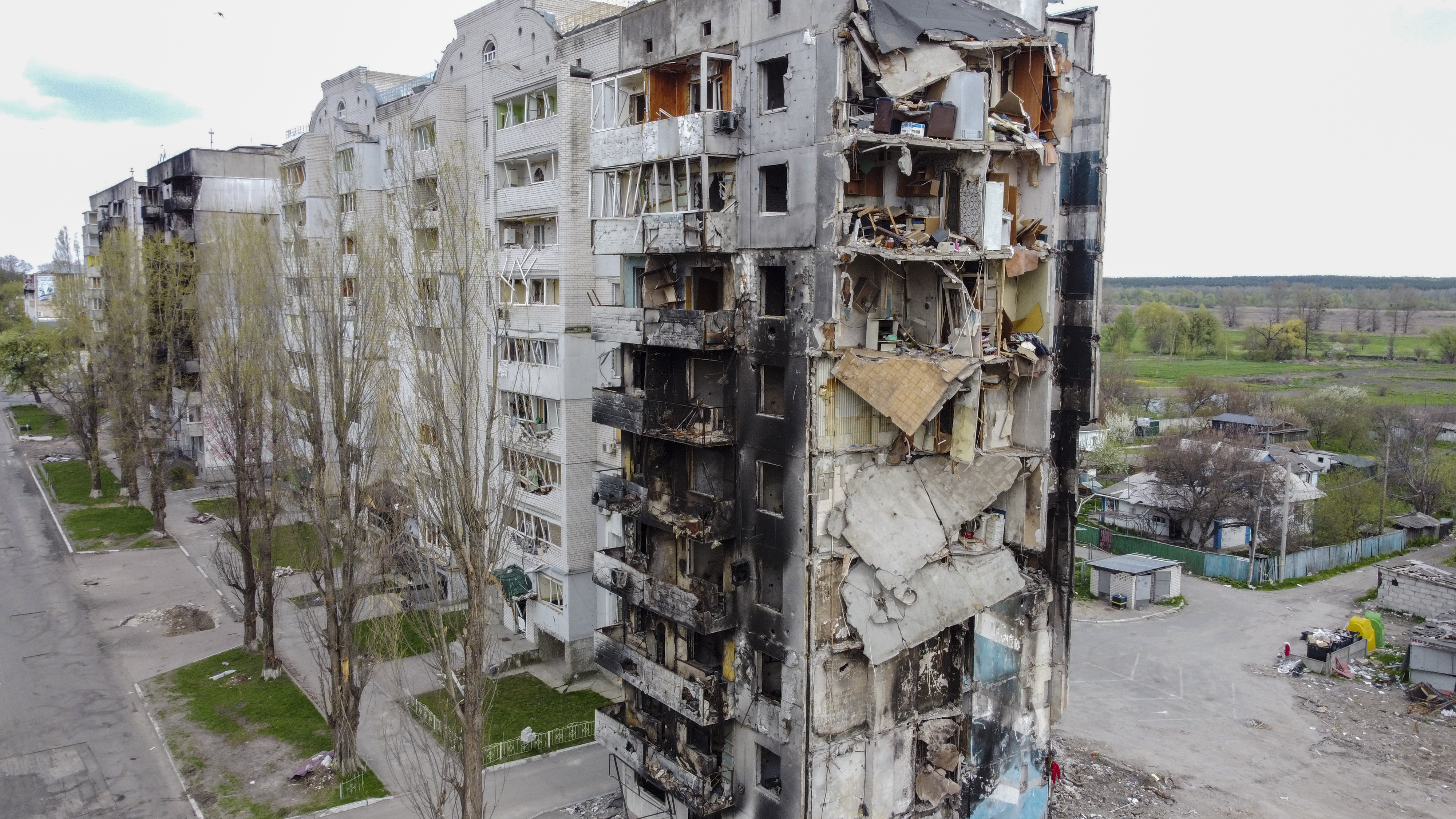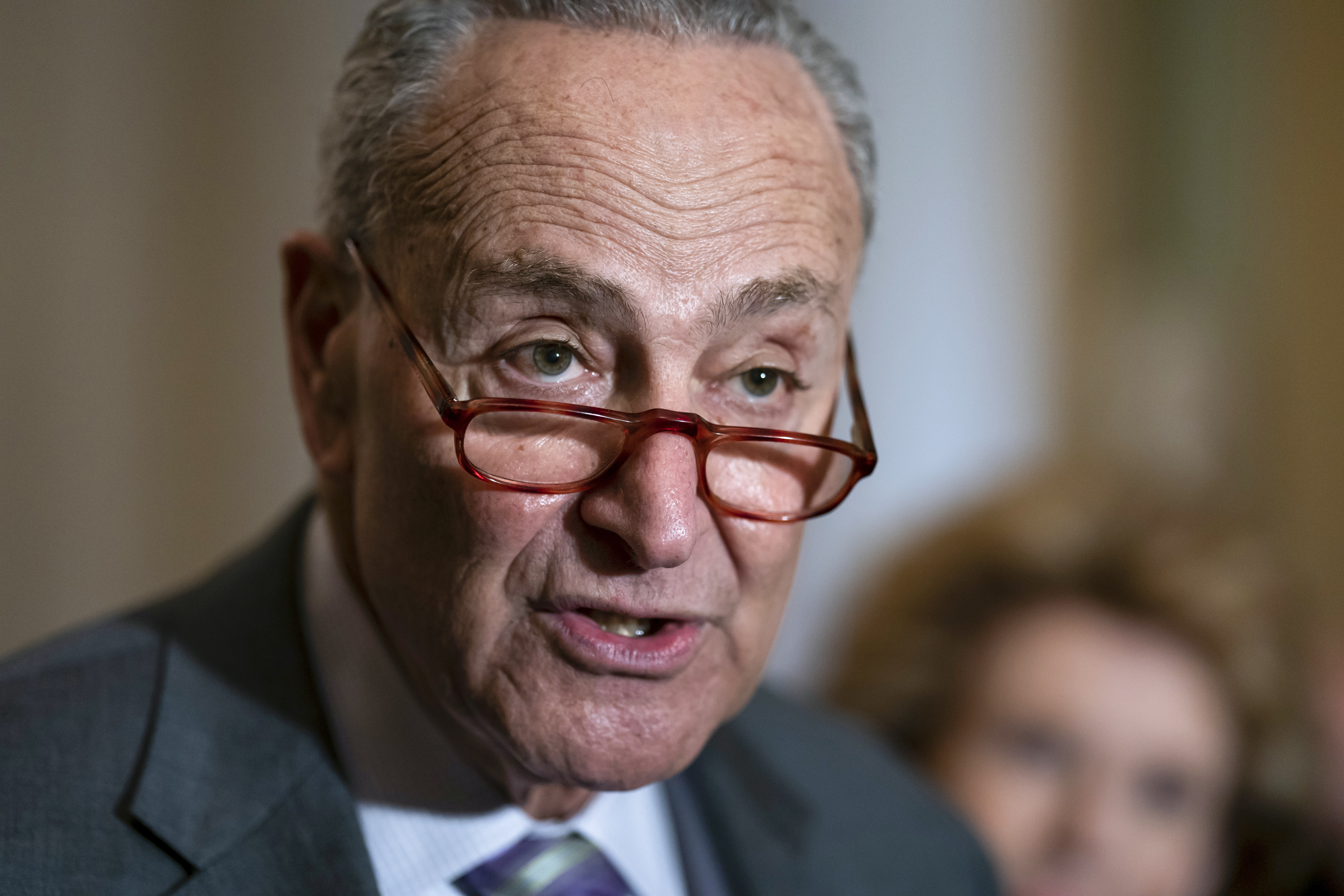
The United States accused Russia of using a U.N. Security Council meeting Friday for "lying and spreading disinformation” as part of a potential false-flag operation by Moscow for the use of chemical or biological agents in Ukraine.
U.S. Ambassador Linda Thomas-Greenfield said Russia was playing out a scenario put forth in the council last month by U.S. Secretary of State Antony Blinken — that President Vladimir Putin would “fabricate allegations about chemical or biological weapons to justify its own violent attacks against the Ukrainian people.”
“The intent behind these lies seems clear, and is deeply troubling,” she said. “We believe Russia could use chemical or biological agents for assassinations, as part of a staged or false-flag incident, or to support tactical military operations.”
The United States has warned about such Russian operations in conjunction with an invasion, which began Feb. 24.
Russia had requested the meeting to address its allegations of U.S. “biological activities” in Ukraine — a charge made without any evidence and denied by both Washington and Kyiv.
Russia’s U.N. Ambassador Vassily Nebenzia said its Defense Ministry had documents charging that Ukraine has at least 30 biological laboratories carrying out “very dangerous biological experiments” involving pathogens, and its work “is being done and funded and supervised by the Defense Threat Reduction Agency of the United States."
Ukraine does have a network of biological labs that have gotten funding and research support from the U.S. — but they are owned and operated by Ukraine and are part of an initiative called the Biological Threat Reduction Program that aims to reduce the likelihood of deadly outbreaks, whether natural or manmade. The U.S. efforts date back to work in the 1990s to dismantle the former Soviet Union’s program for weapons of mass destruction.
“The labs are not secret,” said Filippa Lentzos, a senior lecturer in science and international security at King’s College London, in an email to the Associated Press. “They are not being used in relation to bioweapons. This is all disinformation.”
Britain’s U.N. Ambassador Barbara Woodward, called the allegations “utter nonsense” and said “Russia is sinking to new depths today, but the council must not get dragged down with it.”
U.N. disarmament chief Izumi Nakamitsu told the council she was aware of media reports about the allegations of and said: “The United Nations is not aware of any biological weapons programs.”
Thomas-Greenfield also denied that Ukraine has a biological weapons program or biological weapons labs as Russia claimed, saying the public health laboratory facilities are used to detect and diagnose diseases like COVID-19, with U.S. help.
More Russia-Ukraine War Coverage
Thomas-Greenfield said that ever since Russia began building up forces near Ukraine's borders, Washington's strategy has been to counter Moscow' tactics and share what it knows with the world.
“We’re not going to let Russia get away with lying to the world or staining the integrity of the Security Council by using it as a venue for legitimizing Putin’s violence,” she said.
“We do not sit in this chamber to be an audience for Russia’s domestic propaganda,” Thomas-Greenfield added. “And we should not allow Russia to abuse its permanent seat to spread disinformation and lies and pervert the purpose of the Security Council.”
She also accused Russia’s ally, China, of “spreading disinformation in support of Russia’s outrageous claims.” China’s U.N. Ambassador Zhang Jun expressed concern at Russia's accusations and urged an investigation to “provide a comprehensive clarification and accept a multilateral verification.”
Britain’s Woodward said the Security Council must not be “an audience for Russia’s domestic propaganda” and must remain focused on Russia’s invasion of Ukraine.
Ukraine’s U.N. Ambassador Sergiy Kyslytsya said Moscow's accusations "may actually point at Russia preparing another horrific false-flag operation.”
Noting that Russia has already used cruise missiles, multiple rocket launchers and heavy aerial bombardment, he addressed Putin by asking: “So what else are you going to use against Ukraine?”
The U.N. human rights office, meanwhile, has received “credible reports” that Russian forces are using cluster munitions in Ukraine, including in populated areas which is prohibited under international humanitarian law, Undersecretary-General Rosemary DiCarlo told the Security Council.
“Indiscriminate attacks, including those using cluster munitions, which are of a nature to strike military objectives and civilians or civilian objects without distinction, are prohibited under international humanitarian law,” DiCarlo said. “Directing attacks against civilian and civilian objects, as well as so-called area bombardment in towns and villages, are also prohibited under international law and may amount to war crimes.”
Nebenzia replied that the allegations are "refuted repeatedly by our Ministry of Defense.”
The Russian request for the Security Council meeting came from its first deputy U.N. ambassador, Dmitry Polyansky. Russian Foreign Ministry spokeswoman Maria Zakharova had made the accusation earlier this week.
White House press secretary Jen Psaki called Russia’s claim “preposterous” and tweeted: “This is all an obvious ploy by Russia to try to justify its further premeditated, unprovoked, and unjustified attack on Ukraine.”
Ukrainian President Volodymyr Zelenskyy also denied Russia’s accusation, saying the accusation itself was a bad sign.
“That worries me very much because we have often been convinced that if you want to know Russia’s plans, they are what Russia accuses others of,” he said late Thursday. “No chemical or any other weapon of mass destruction has been developed on my land. The whole world knows this.”
Pentagon press secretary John Kirby called the Russian claim “a bunch of malarkey.”
U.N. spokesman Stephane Dujarric said the World Health Organization, which has been working with the Ukrainian government, said it was “unaware of any activity on the part of the Ukrainian government which is inconsistent with its international treaty obligations, including on chemical weapons or biological weapons.”
The international community for years has assessed that Russia used chemical weapons in carrying out assassination attempts against its political opponents such as Alexei Navalny, now in a Russian prison, and former spy Sergei Skripal, who lives in the U.K. Russia also supports the Syrian government, which has used chemical weapons against its people in an 11-year civil war.
“Russia has a well-documented history of using chemical weapons and has long maintained a biological weapons program in violation of international law,” said Olivia Dalton, spokesperson for the U.S. Mission to the United Nations. She added Moscow has “a track record of falsely accusing the West of the very violations that Russia itself is perpetrating.”
This is a live update. Click here for complete coverage of the crisis in Ukraine.



